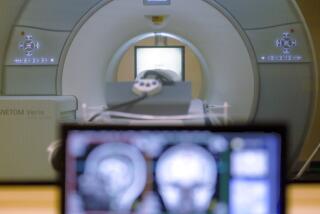Call Gives Her the Gift of Life for Christmas
- Share via
CHICAGO — Kym Curbow thought this Christmas might be her last. Instead, she got the best present she could hope for: The diagnosis of an inoperable brain tumor was wrong and she will be at home and healthy for the holidays.
“When I walked in and said we have the final diagnosis, everyone held their breath,” her neurosurgeon, George Dohrmann, said Wednesday. “I said, ‘Kym, Christmas has come early.’ ”
A national “brain tumor hot line” made the difference for the 20-year-old nursing student, who refused to settle for the extremely bleak prognosis she was given in August.
“A few months ago, I didn’t think I’d have the rest of my life,” Curbow said from her bed at the University of Chicago Medical Center, where she is to be released today. “Now I know the whole thing is over, that it’s all gone.”
Curbow was referred to an Atlanta neurosurgeon after complaining to her internist about severe headaches. The neurosurgeon performed a biopsy and told her she had a tumor that was inoperable.
Curbow turned to the Brain Tumor Information Service, a free national hot line run at the University of Chicago Medical Center for people who need information on tumors.
Doctors who volunteer for the service talk with callers, frequently send additional medical information to them, and often ask to see medical records.
After looking at Curbow’s medical report and pathology slides from her Atlanta neurosurgeon, “we said two things,” Dohrmann recalled. “We weren’t convinced it was a tumor, and second, we thought there would be a way to remove it safely.”
What had appeared to be a brain tumor turned out to be an epithelial cyst next to Curbow’s brain stem, where vital brain functions occur.
The cyst was removed Dec. 4. It likely began with irregular cell development before Kym was born and may have been the cause of her headaches, said Dohrmann.
Dohrmann said Curbow’s Atlanta doctor was not at fault, but that “sometimes there are known treatments that can help people like this and (doctors) just aren’t aware of them.”
The purpose of the hot line is “making national resources available so that people don’t have to depend just on what’s available locally,” he said.
More to Read
Sign up for Essential California
The most important California stories and recommendations in your inbox every morning.
You may occasionally receive promotional content from the Los Angeles Times.













